Why the story of Canton's B. Virdot resonates 90 years later at Christmas time
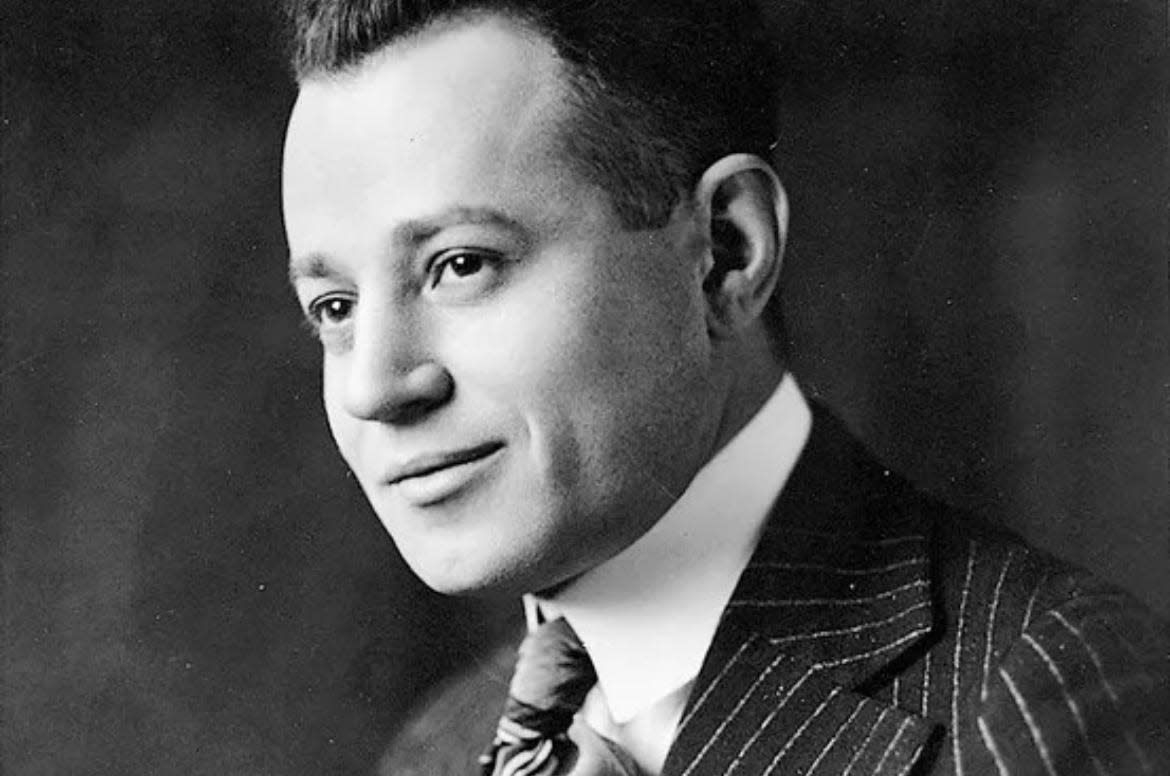
The Depression-era generosity was intended to be what decades later would be called "A Secret Gift."
"In Consideration Of The White Collar Man!"
That was the ad placed in The Canton Repository 90 years ago by an individual calling himself "B. VIRDOT."
"Suppose if I were confronted with an economic situation where the bread of tomorrow is the problem of today — there is a question in my mind if I would accept charity directly offered by welfare organizations," began the ad placed in the Dec. 18, 1933, edition of the Repository. "I know there are hundreds of men that are confronted with economic problems and think, feel and act the same way."
B. Virdot offered in the ad to provide less embarrassing assistance to people of the Canton area who were in need during those dark days of the "Great Depression."
"To men or families in such position the maker of this offer, who will remain unknown to the very end, will be glad if he is given an opportunity to help from 50 to 75 such families so they will be able to spend a merry and joyful Christmas," the ad offered. "To such men or families that will request such financial aid, the writer pledges that their identity will never be revealed."
More Monday After: 'A Secret Gift' letters return
The ad requested that those desiring monetary gifts should "please write: B. VIRDOT, General Delivery, Canton, Ohio."
"In writing, please familiarize me with your true circumstances and financial aid will be promptly sent."
Letters to B. Virdot quickly poured in.
Canton Repository publicizes charity offer by B. Virdot
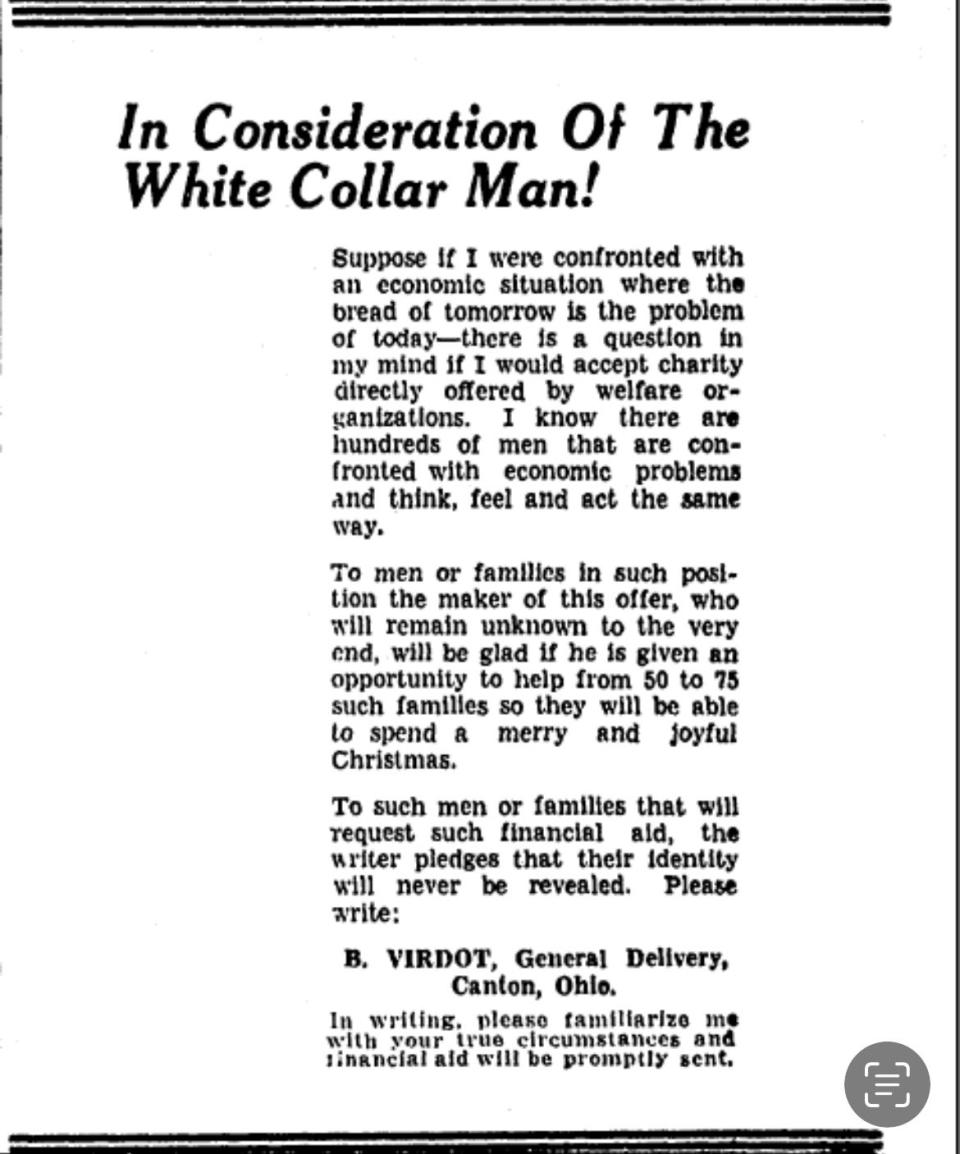
On the same day the advertisement appeared in the paper, a week before Christmas, the Repository printed a front-page article about the offer.
"Man Who Felt Depression's Sting To Help 75 Unfortunate Families," a headline said, with another adding "Anonymous Giver, Known Only As 'B. Virdot', Posts $750 To Spread Christmas Cheer."
Beyond calling him "a well-known local business man," the Repository identified the generous giver only as "a Canton man who was toppled from a large fortune to practically nothing but whom returning prosperity has helped fight back to wealth and comfort."
"B. Virdot was headed into bankruptcy," the Repository explained. "But there were friends who believed in him and creditors who had confidence that he would come back. He hung on, and fought. Improving business brought added encouragement. Today, with several months of steadily increasing profits behind him, he is well on his way to a second chapter in success."
So, he decided to share his good fortune.
"This is a genuine Christmas gift, involving no strings and no embarrassment to the recipients," the Repository's article reported. "The donor has set aside $750, divided into 75 $10 money orders. They are especially intended for men who, like the giver, have once held responsible positions, have been deprived of their income through general economic conditions, but who hesitate to knock at charity's door for aid."
The small gifts in 1933 actually could have large impacts on each recipient's holiday celebration. Each $10 gift offered by B. Virdot 90 years ago would be worth over $225 today.
So many letters asking for assistance came in that B. Virdot eventually decided to cut the amount in half but double the number of gifts. Even then each of the now 150 gifts was worth more than $100 in today's dollars.
"The name, 'B. Virdot,' is, of course, fictitious," the newspaper noted. "Perhaps the name, 'Kris Kringle' is fictitious, too, but the genuineness of the spirit of giving he represents have never been questioned. In such spirit does 'B. Virdot' ask to share his Christmas."
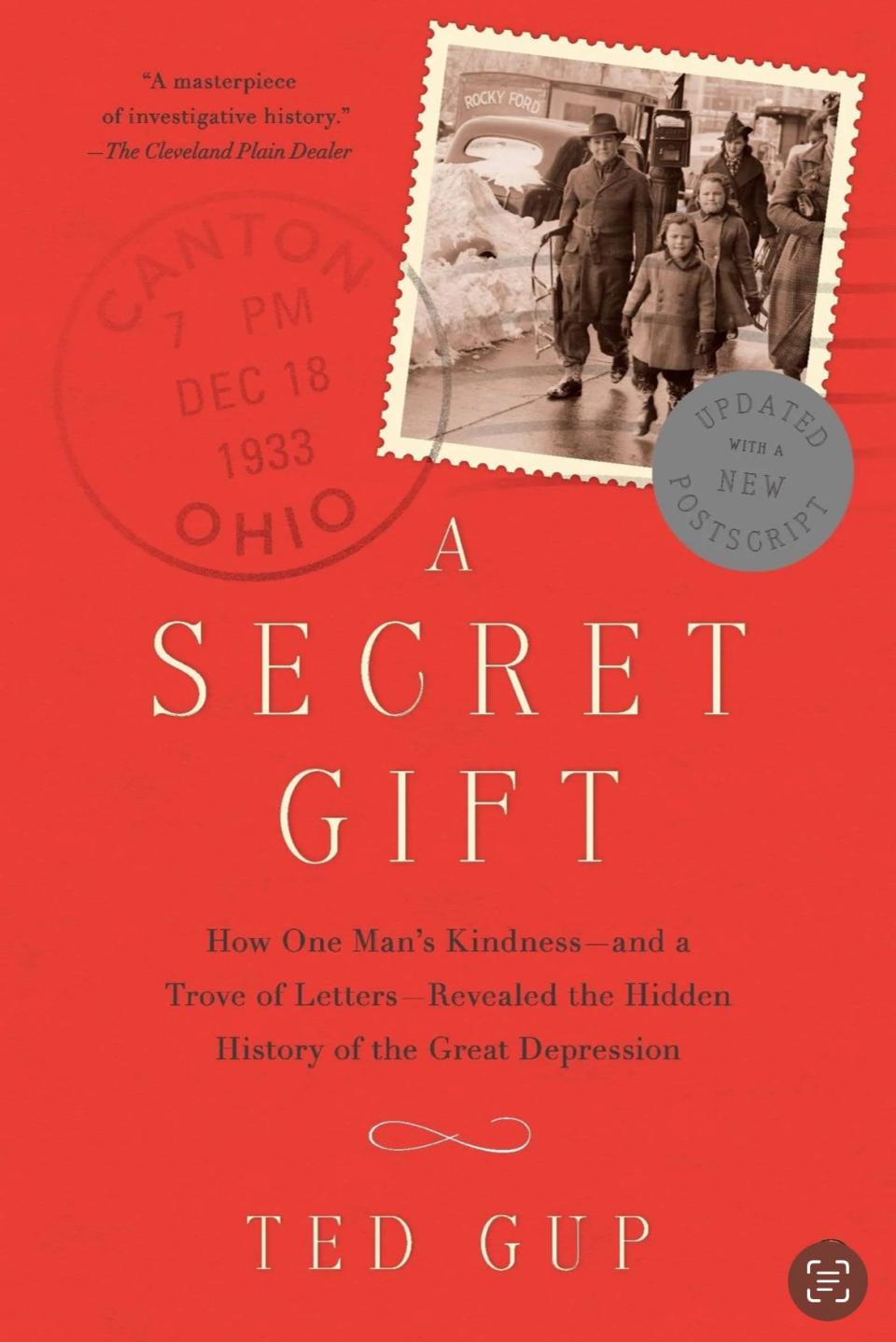
Christmas story inspires gifts
The identity of B. Virdot and the names of those who received his charity gifts remained secret for more than half a century. Ultimately, however, the shroud of secrecy promised by his ad, was removed, and the name of the generous gift-giver was unveiled.
Decades later, in the 1990s, former Cantonian Ted Gup, a journalist and professor, discovered that B. Virdot was his grandfather Sam Stone, a clothing store operator who had suffered and recovered from his own Depression-caused financial crisis.
In 2010, Gup published a book about the revelation entitled, "A Secret Gift: How One Man's Kindness — and a Trove of Letters — Revealed the Hidden History of the Great Depression."
The book explains how Gup's grandfather had gone to a recitation of "A Christmas Carol" at First Presbyterian Church on Sunday, Dec. 17, 1977. Following the traditional holiday event, Stone thought of the dire circumstances many in Canton found themselves in 90 years ago.
He walked to the Repository. He placed an ad.
"A mere 158 words, it would catch the eye of the entire town, be passed from household to household, then spread by word of mouth well beyond, making news as far away as New York," Gup wrote.
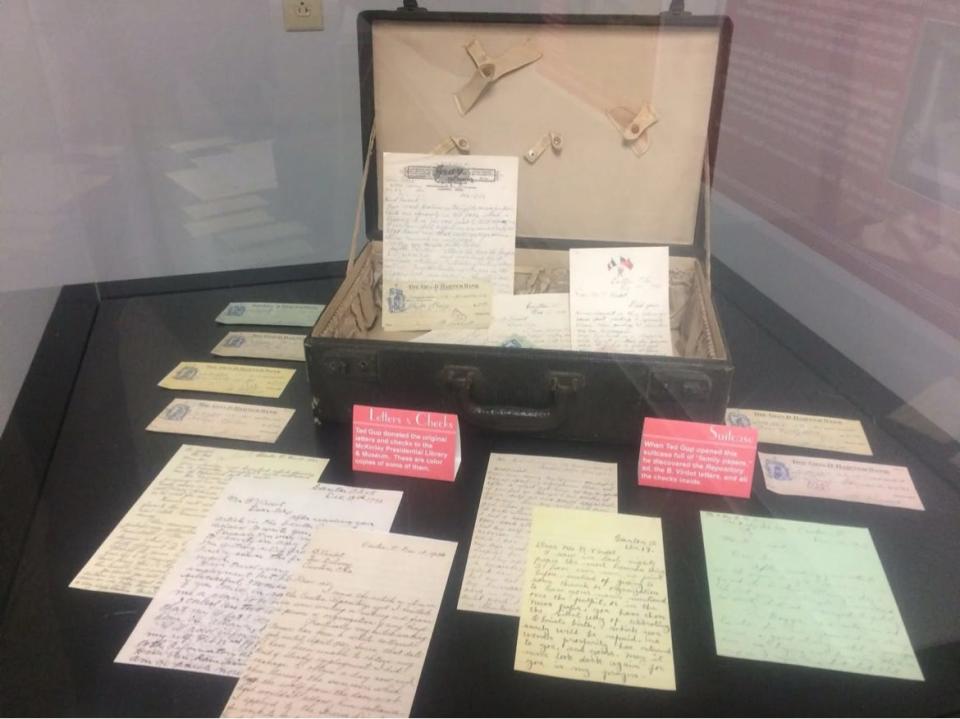
Canton community responds
Letters poured in — "from every walk of life," wrote Gup — as desperate Stark County residents learned of B. Virdot's offer.
"A roofer, a car dealer, a locksmith, a millworker, a carpenter, a stonecutter, a musician, a grocer, a farmer, an ex-con, a butcher, a bell captain, a railroad man, a cobbler, a bricklayer, a bookie, a pastor's assistant, and an array of fallen executives," he listed.
"There was Harry Stanley, a blacksmith out of work for two years, who hoped his five small children might have something for Christmas; there were James Burson, a cook whose last job was in July 1931, and Dan Jordan, a Timken Company policeman whose pay and hours had been slashed and who fretted about his four children, two of whom were deaf; there was Joe Rogers, an unemployed janitor, and Charles Minor, a jobless steeljack living on bread and coffee; there was Ervin Neiss, a pipe fitter swamped by hospital bills and locked out from his own life savings by the American Exchange Bank; and Ethel Dickerhoff, a mother of nine whose husband was a plumber with no work in sight."
Richard E. Anderson, in an identifying postscript, called himself "an office man," Gup noted, but by the time he posted his letter his self-image had begun to include any odd jobs he could find.
"How many letters came in — whether it was hundreds or thousands — no one knows," Gup wrote in his book. "And true to his word, within days, the shadowy B. Virdot sent out the promised checks, all of them arriving before Christmas."
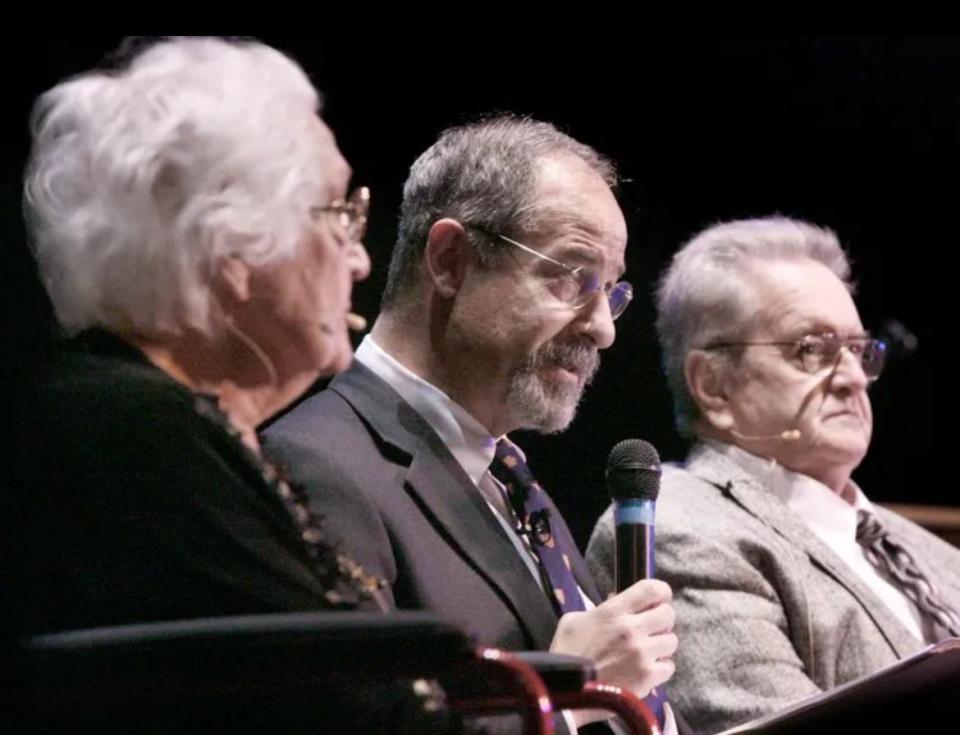
The 'secret' of B. Virdot is revealed
How did Gup come to find out the identities and the life stories of recipients? And what allowed him to learn that B. Virdot was his grandfather?
Answers were found in an old and worn family suitcase. It was "crammed with old papers," Gup recalled in his book. Plainly visible was a large yellow envelope marked "XMAS GIFT DISTRIBUTION."
"Inside the packet was a tight sheaf of letters," wrote Gup. "I withdrew a handful. All of them were dated December 18, 1933 -- the week before Christmas. Among the letters I found a tiny black passbook from Canton's George D. Harter Bank. It recorded a single deposit of $750. There were also some 150 canceled checks, each neatly signed 'B. Virdot.'
"B. Virdot was my grandfather. His name was Sam Stone."
Gup later would learn from his mother the origin of the name "B. Virdot," which had sounded familiar to him.
"'B. Virdot,' she said, was constructed from the names of Sam and (Gup's grandmother) Minna's three daughters," Gup recalled. "Barbara, Virginia, and Dorothy, known as 'Dotsy.' My mother was the 'Vir' in 'B. Virdot.'"
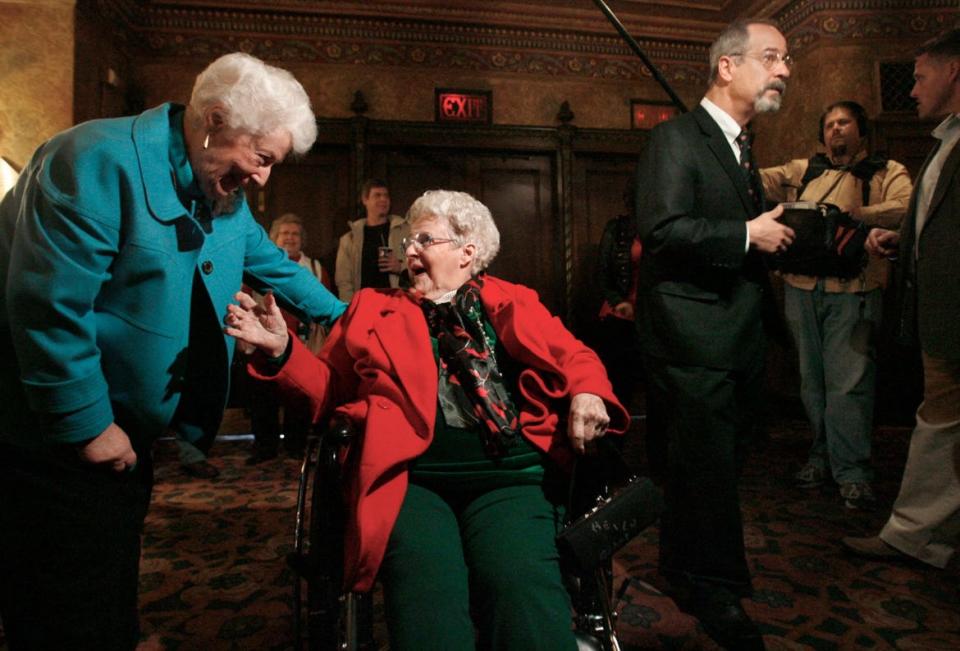
'A Secret Gift' repeated
In "A Secret Gift," a volume the Akron Beacon Journal called an extraordinary new book and the Repository said was a gem, Gup retraced the circumstances of several of the families who wrote letters to B. Virdot. They were "wrenching stories of suffering, loss, endurance, humility, and gratitude," according to a Booklist review.
On Nov. 5, 2010, Gup and descendants of letter writers — along with 92-year-old Helen Palm Kintz, the sole surviving letter writer — gathered at the Palace Theatre in Canton for a book publication event called "An Evening To Remember." Composer Phillip Bimstein and his group Red Rock Rondo performed ballads with lyrics drawn from the letters.
The celebration of "A Secret Gift" was filmed and recorded by such national news organizations as CBS Sunday Morning and National Public Radio.
"Within days of the event, three Canton businessmen came forward and pledged gifts to families in need," recalled Gulp in a postscript for the paperback edition of "A Secret Gift," published in 2011. "They were inspired by B. Virdot's example. Like Stone, they decided to give anonymously. And like Stone, they invited the community to address B. Virdot, care of the Canton Repository and offered to help 150 families before Christmas. They adjusted the gift for inflation. Instead of $5, they offered each family $100 — $15,000 in total. Their pledge was advertised in the Thanksgiving issue of the Repository."
The gifts of the three men inspired others to contribute — about 200 individuals contributed more than $53,000. The 2010 B. Virdot gift campaign, overseen by United Way, was repeated in 2011, with similar results.
B. Virdot remembered
In 2013, the 80th anniversary of B. Virdot's generosity, "A Secret Gift" was chosen for the One Book, One Community literacy program, a series of events that brought the B. Virdot's Depression-era generosity to life in discussions and on stage.
A dramatization of "A Secret Gift" — a one-act play by Frank Motz — was performed in what then was the Kathleen Howland Theatre in 2nd April Galerie in downtown Canton. Panel and roundtable discussions were held at the Sippo Branch of Stark Library. A walking tour of downtown historical sites pointed out places mentioned in Gup's writing.
The McKinley Presidential Library & Museum presented "A Secret Gift" exhibition its Keller Gallery, including original letters sent to B. Virdot in 1933, desperate missives Gup donated to the museum. At Stark County District Library Lauren Landis, then head of the genealogy department, explained to patrons in a talk how she helped Gup research his book.
A "Meet the Author" event at Malone College allowed Gup to discuss his work and answer questions about economic conditions in Canton in the Depression.
And, a holiday concert called "A Very Canton Christmas" featured a musical composition by Eric Benjamin -- narrated by Gup -- that set a recollection of B. Virdot's Christmas offer to music of Canton Symphony Orchestra and words recited by members of the community.
So, the gift of B. Virdot is not a secret anymore. Gup noted that his book has been translated into several languages. The story about B. Virdot's Christmas giving is known throughout the world.
"Readers have told me that the story has the feel of a parable," Gup wrote in his postscript, "a tale of selfless giving and of the power of a single gesture of goodwill."
Reach Gary at gary.brown.rep@gmail.com.
On "X" (formerly Twitter): @gbrownREP
This article originally appeared on The Repository: B. Virdot of Canton gives away money in Depression

